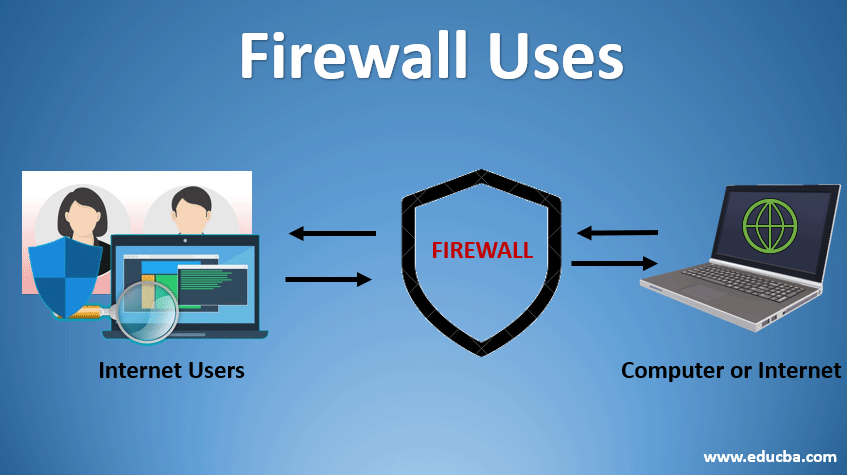4 Reasons to Invest in a Firewall

Firewalls are businesses’ first line of defense against cyber-attacks and data breaches. Besides security, firewalls provide many other benefits, such as network performance and employee productivity.
A firewall can block unauthorized access to your system by stopping port scans and other threats. It can also control network bandwidth to prioritize business applications and limit streaming non-work related activities.
Protects Your Data
So, how does a firewall work? Firewalls monitor data traffic and only allow inbound or outbound information per preestablished rules. They protect from online threats like hacking, phishing, and identity theft. They can also help prevent the spreading of viruses that shut down digital operations in a business, organization, or home.
Connecting personal computers to a network or the Internet offers many benefits, including easy collaboration, sharing of resources, and enhanced creativity. However, it also exposes those devices to various risks, including hacking, malware, and identity theft. Firewalls offer a first line of defense to help keep your personal computer and its information safe from cyber threats.
A firewall scans the incoming information in data packets and compares it to a list of threat signatures. If it matches a malicious signature, the information is discarded. This is an essential function offered by most software-based firewalls, which can monitor programs running on your system and filter communication to or from them.
Next-generation firewalls (NGFW) feature more sophisticated features than traditional firewalls, such as deep packet inspection and application awareness. This technology examines packets in the context of all layers of a standard Internet communications protocol (OSI). It can also enforce more granular rules, such as restricting inbound or outbound activity to specific port numbers. Moreover, it can detect and respond to a wide range of network attacks faster by adjusting policies automatically without human intervention.
Prevents Viruses
Firewalls prevent viruses by analyzing all data that enters or exits your network and making decisions based on pre-installed rules. Each piece of data sent over the Internet is assembled into a packet that contains core data and information about the sender and destination, such as IP addresses and ports. Before a package is delivered, it goes through a firewall for inspection. If the rules are satisfied, the packet is allowed to proceed. If not, the firewall blocks the box.
When a firewall detects a virus, it stops it from reaching the computers in your network. This prevents cyberattacks and malware installation. Firewalls can also block connections to known command and control infrastructure, which makes it harder for attackers to send commands to infected machines. This prevents large groups of devices, called botnets, from being controlled by a malicious actor.
In addition to blocking viruses, a firewall can filter web content based on specific keywords or phrases. This can help businesses create a work environment without inappropriate or harmful web content. For example, employers can use a firewall to block access to websites that sell pornographic or illegal material. This can help ensure a safe working environment and prevent employee distractions that hinder productivity. Firewalls can even prevent employees from browsing social media sites unrelated to business activities.
Prevents Hackers from Accessing Your Network
Firewalls are an essential component of cybersecurity for your company. They prevent hackers from accessing your network, protecting you against data breaches and other cybercriminal activity. IT technicians work around the clock to secure data within a network. Still, hackers specializing in malware and other threats always seek an opportunity to gain access and steal that information or exploit vulnerabilities in your system for financial gain.
When a firewall detects unauthorized traffic, it blocks the source of the traffic. This helps to prevent hacker attacks and protects you from the financial repercussions of data breaches.
Most modern firewalls also include content filtering features to block websites known to contain malicious software. This feature prevents employees from accidentally downloading malware that can compromise the security of your system.
The most advanced firewalls use stateful inspection to monitor incoming and outgoing data packets at the application level. This helps to prevent web servers from being hacked and infiltrated with malicious code disguised as legitimate requests for data. These newer firewalls are often referred to as proxy-based or reverse-proxy firewalls.
Some firewalls also use a DMZ (Demilitarized Zone) to isolate low-risk files and applications from the leading network, helping to avoid potential vulnerabilities. This is often a feature of UTM (Unified Threat Management) solutions, which combine the functionality of firewalls with antivirus and intrusion detection systems to provide comprehensive cybersecurity protection.
Promotes Privacy
Firewalls monitor data coming in and out of a network and use pre-established rules to block suspicious activities. This prevents cyberattacks like spyware from gaining entry and stealing your data.
There are a few different firewall types, each offering its benefits. Software firewalls are computer programs that can be installed on user devices to monitor and regulate network traffic. These are often included in the latest operating systems and available for free download from the Internet. However, because they are installed and maintained individually on each device, these types of firewalls can be slow to update.
Hardware firewalls are physical appliances that act as a router to intercept data packets and traffic requests. They are typically slower to install and update than software-based firewalls but are more effective at blocking cyberattacks.
Traditional firewalls could be more convenient and affordable to manage. They may need help to adapt as your business operations evolve and can create a bottleneck at the data inspection point, slowing down your network.
Another downside of traditional firewalls is that they only sometimes detect advanced threats and malware. To prevent this, a next-generation firewall (NGFW) analyzes the contents of each data packet and its source and destination. It can also assess the relationship between a network’s private and public internet connections, assessing whether inbound traffic is solicited.





